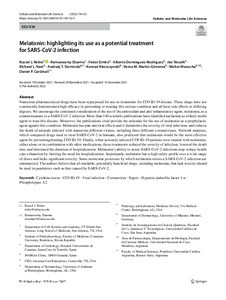Por favor, use este identificador para citar o enlazar este ítem:
https://repositorio.uca.edu.ar/handle/123456789/13681| Título: | Melatonin : highlighting its use as a potential treatment for SARS‑CoV‑2 infection | Autor: | Reiter, R. Sharma, Ramaswamy Simko, Fedor Domínguez Rodriguez, Alberto Tesarik, Jan Neel, Richard L. Slominski, Andrzej T. Kleszczynsk, Konrad Martin‑Gimenez, Verna M. Manucha, Walter Cardinali, Daniel Pedro |
Palabras clave: | CITOQUINAS; INFECCIONES; COVID-19; CORONAVIRUS; SEPSIS; HIPOXIA | Fecha de publicación: | 2022 | Editorial: | Springer | Cita: | Reiter, R. et al. Melatonin : highlighting its use as a potential treatment for SARS‑CoV‑2 infection [en línea]. Cellular and Molecular Life Sciences. 2022, 79 (143). doi: 10.1007/s00018-021-04102-3. Disponible en: https://repositorio.uca.edu.ar/handle/123456789/13681 | Resumen: | Abstract: Numerous pharmaceutical drugs have been repurposed for use as treatments for COVID-19 disease. These drugs have not consistently demonstrated high efcacy in preventing or treating this serious condition and all have side efects to difering degrees. We encourage the continued consideration of the use of the antioxidant and anti-infammatory agent, melatonin, as a countermeasure to a SARS-CoV-2 infection. More than 140 scientifc publications have identifed melatonin as a likely useful agent to treat this disease. Moreover, the publications cited provide the rationale for the use of melatonin as a prophylactic agent against this condition. Melatonin has pan-antiviral efects and it diminishes the severity of viral infections and reduces the death of animals infected with numerous diferent viruses, including three diferent coronaviruses. Network analyses, which compared drugs used to treat SARS-CoV-2 in humans, also predicted that melatonin would be the most efective agent for preventing/treating COVID-19. Finally, when seriously infected COVID-19 patients were treated with melatonin, either alone or in combination with other medications, these treatments reduced the severity of infection, lowered the death rate, and shortened the duration of hospitalization. Melatonin’s ability to arrest SARS-CoV-2 infections may reduce health care exhaustion by limiting the need for hospitalization. Importantly, melatonin has a high safety profle over a wide range of doses and lacks signifcant toxicity. Some molecular processes by which melatonin resists a SARS-CoV-2 infection are summarized. The authors believe that all available, potentially benefcial drugs, including melatonin, that lack toxicity should be used in pandemics such as that caused by SARS-CoV-2. | URI: | https://repositorio.uca.edu.ar/handle/123456789/13681 | Disciplina: | MEDICINA | DOI: | 10.1007/s00018-021-04102-3 | Derechos: | Acceso abierto | Fuente: | Cellular and Molecular Life Sciences. 2022, 79 (143) |
| Aparece en las colecciones: | Artículos Artículos |
Ficheros en este ítem:
| Fichero | Descripción | Tamaño | Formato | |
|---|---|---|---|---|
| melatonin-highlighting-use.pdf | 1,26 MB | Adobe PDF |  Visualizar/Abrir |
Visualizaciones de página(s)
77
comprobado en 27-abr-2024
Descarga(s)
55
comprobado en 27-abr-2024
Google ScholarTM
Ver en Google Scholar
Altmetric
Altmetric
Este ítem está sujeto a una Licencia Creative Commons

